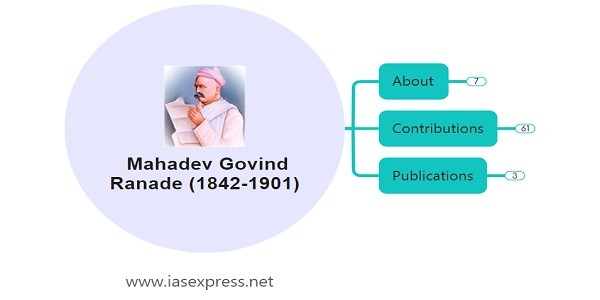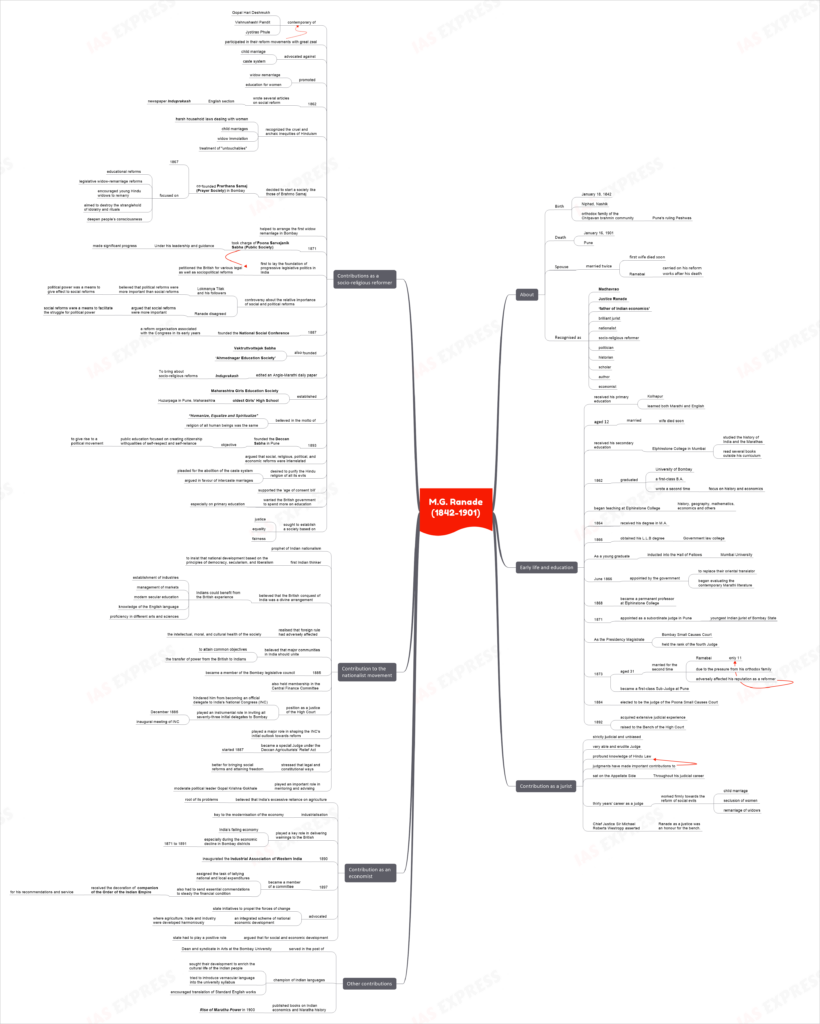Mahadev Govind Ranade – Biography & Contributions

Mahadev Govinda Ranade (1842–1901), also called Madhavrao and Justice Ranade was a brilliant jurist, nationalist, socio-religious reformer, politician, historian, scholar, author, and economist. He is known as the ‘father of Indian economics’ and was one of the early nationalists who inspired many young nationalists to devote their life to national service.

Early life and education
- M.G. Ranade was born in Niphad, Nashik, on January 18, 1842, into an orthodox family of the Chitpavan brahmin community of Pune’s ruling Peshwas.
- Ranade received his primary education in Kolhapur, learning both Marathi and English.
- At the age of 12, Ranade was married. However, his wife died soon.
- He received his secondary education at Elphinstone College in Mumbai. He studied the history of India and the Marathas and read several books outside his curriculum.
- In 1862, Ranade graduated from the University of Bombay and secured a first-class B.A. He wrote his exams a second time with a focus on history and economics and began teaching history, geography, mathematics, economics, logic, English, and writing at Elphinstone College.
- In 1864, he received his degree in M.A. In 1866, he obtained his L.L.B degree from the Government law college.
- As a young graduate, he was inducted into the Hall of Fellows of Mumbai University.
- In June 1866, he was appointed by the government to replace their oriental translator where he began evaluating the contemporary Marathi literature being published at the time.
- In 1868, he became a permanent professor at Elphinstone College.
- In 1871, he was appointed as a subordinate judge in Pune becoming the youngest Indian jurist of Bombay State. As the Presidency Magistrate, he held the rank of the fourth Judge in the Bombay Small Causes Court.
- In 1873, when Ranade was aged 31, he married for the second time to the much younger Ramabai, who was only 11, due to the pressure from his orthodox family. This adversely affected his reputation as a reformer. In the same year, he became a first-class Sub-Judge at Pune.
- In 1884, he was elected to be the judge of the Poona Small Causes Court.
- As a Presidency Magistrate, Judge of the Small Causes Court, and Sub-Judge, he acquired extensive judicial experience and was raised to the Bench of the High Court in 1892.
Contribution as a jurist
- Ranade as a jurist was strictly judicial and unbiased in his approach. He was a very able and erudite Judge.
- He had a very profound knowledge of Hindu Law and his judgments have made important contributions to this branch of law.
- Throughout his judicial career, he sat on the Appellate Side. During his thirty years’ career as a judge, he worked firmly towards the reform of social evils such as child marriage, and the seclusion of women and tried to introduce the remarriage of widows.
- Chief Justice Sir Michael Roberts Westropp asserted that to have Ranade as a justice was an honour for the bench.
Contribution as a socio-religious reformer
- Ranade was a contemporary of Gopal Hari Deshmukh, Vishnushastri Pandit, and Jyotirao Phule, who started many social reform movements. Ranade participated in their reform movements with great zeal.
- Ranade advocated against child marriage and the caste system and promoted widow remarriage and education for women.
- In 1862, he wrote several articles on social reform in the English section of the newspaper Induprakash.
- Ranade recognized the cruel and archaic inequities of Hinduism, especially its harsh household laws dealing with women, child marriages, widow immolation, and the treatment of “untouchables.”
- He decided to start a society like those of Brahmo Samaj started by Raja Ram Mohan Roy and others.
- In 1867, Ranade along with several like-minded reformers founded Prarthana Samaj (Prayer Society) in Bombay.
- The Samaj focused first on educational reforms and later on legislative widow-remarriage reforms, encouraging young Hindu widows to remarry. It also aimed to destroy the stranglehold of idolatry and rituals and deepen people’s consciousness.
- Ranade himself helped to arrange the first widow remarriage in Bombay.
- In 1871, Ranade took charge of Poona Sarvajanik Sabha (Public Society). Under his leadership and guidance, the organization made significant progress. He was the first to lay the foundation of progressive legislative politics in India. The organisation petitioned the British for various legal as well as sociopolitical reforms.
- Ranade’s efforts took place against the backdrop of controversy about the relative importance of social and political reforms. Lokmanya Tilak and his followers believed that political reforms were more important than social reforms because political power was a means to give effect to social reforms. However, Ranade disagreed and argued that social reforms were more important.
- To Ranade, social reforms were a means to facilitate the struggle for political power.
- In 1887, Ranade along with several other leaders founded the National Social Conference which was a reform organisation associated with the Congress in its early years.
- He also founded Vaktruttvottejak Sabha and ‘Ahmednagar Education Society’ which aimed at benefitting society.
- To bring about socio-religious reforms, he edited an Anglo-Marathi daily paper, the Induprakash.
- Ranade, along with Vaman Abaji Modak and Dr R.G. Bhandarkar, established the Maharashtra Girls Education Society and the oldest Girls’ High School at Huzurpaga in Pune, Maharashtra.
- Ranade believed in the motto of “Humanize, Equalize and Spiritualize”. Therefore, his religious and philosophical views were that the religion of all human beings was the same.
- In 1893, he founded the Deccan Sabha, in Pune which was based on the objective of public education that would focus on creating citizenship with the qualities of self-respect and self-reliance to give rise to a political movement.
- Ranade argued that social, religious, political, and economic reforms were interrelated and thus he focused on all the aspects and suggested reforms all around.
- He also stressed that giving up caste hatred was an important part of liberalism. He believed that the caste system prevented the development of individual capacities and did not ensure equality of opportunity.
- He desired to purify the Hindu religion of all its evils. He pleaded for the abolition of the caste system and argued in favour of intercaste marriages. He suggested the extension of education and developmental facilities to the lower castes.
- Ranade supported the ‘age of consent bill’ that raised the marriageable age of women.
- Ranade wanted the British government to spend more on education especially on primary education because the latter was greatly neglected.
- He sought to establish a society which was based on justice, equality, and fairness.
Contribution to the nationalist movement
- Ranade was the prophet of Indian nationalism. He was the first Indian thinker to insist that national development must be based on the principles of democracy, secularism, and liberalism.
- Ranade believed that the British conquest of India was a divine arrangement and that Indians could benefit from the British experience in the establishment of industries, management of markets, modern secular education, knowledge of the English language and proficiency in different arts and sciences.
- However, he realised that foreign rule had adversely affected the intellectual, moral, and cultural health of the society.
- Ranade believed that major communities in India should unite to attain common objectives and then the transfer of power from the British to Indians was inevitable.
- In 1885, Ranade became a member of the Bombay legislative council. He also held membership in the Central Finance Committee.
- Ranade’s position as a justice of the High Court hindered him from becoming an official delegate to India’s National Congress (INC) yet he played an instrumental role in inviting all seventy-three initial delegates to Bombay in December 1885 for the inaugural meeting of INC.
- He played a major role in shaping the party’s initial outlook towards reform.
- He became a special Judge under the Deccan Agriculturists’ Relief Act starting in the year 1887.
- He stressed that legal and constitutional ways were better for bringing social reforms and attaining freedom.
- Ranade played an important role in mentoring and advising moderate political leader Gopal Krishna Gokhale.
Contribution as an economist
- Ranade believed that India’s excessive reliance on agriculture was at the root of its problems and that industrialisation was key to the modernisation of the economy.
- He also played a key role in delivering warnings to the British regarding India’s failing economy, especially during the economic decline that Bombay districts suffered from 1871 to 1891.
- In 1890, he inaugurated the Industrial Association of Western India, for he believed that a constructive solution to India’s problems lay in a vigorous policy of industrial and commercial development.
- He became a member of a committee which was assigned the task of tallying national and local expenditures in the year 1897. Along with this, the committee also had to send essential commendations to steady the financial condition.
- Ranade received the decoration of companion of the Order of the Indian Empire for his recommendations and service.
- Ranade advocated state initiatives to propel the forces of change and an integrated scheme of national economic development where agriculture, trade and industry were developed harmoniously. In a nutshell, he argued that for social and economic development the state had to play a positive role.
Other contributions
- Mahadev Govind Ranade also served in the post of Dean and syndicate in Arts at the Bombay University.
- Ranade was a champion of Indian languages and sought their development to enrich the cultural life of the Indian people. He tried to introduce vernacular language into the university syllabus as well as encouraged translation of Standard English works.
- He also published books on Indian economics and Maratha history. His passion for the subjects resulted in his writing Rise of Maratha Power in 1900.
Death
- Ranade passed away on January 16, 1901, in Pune.
- After his death, his reform works were continued by his second wife Ramabai (1862–1924), who became one of the earliest women’s rights activists in the 19th century.

